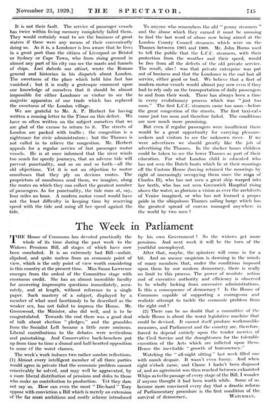The Week in Parliament
THE House of Commons has devoted practically the whole of its time during the past week to the Widows Pensions Bill, all stages of which have now been concluded. It is an extremely bad Bill—unfair, slipshod, and quite useless from an economic point of view, which is the only point of view worth considering in this country at the present time. Miss Susan Lawrence emerges from the ordeal of the Committee stage with enormous credit. She has an almost incredible faculty for answering impromptu questions immediately, accu- rately, and at length, without reference to a single paper. Such mastery of a subject, displayed by a member of what used facetiously to be described as the weaker sex, has not failed to impress the House. Mr. Greenwood, the Minister, also did well, and is to be congratulated. Towards the end there was a good deal of talk about election " pledges," and the grumbles from the Socialist Left became a little more ominous. Liberal contributions to the debates were meticulous and painstaking. And Conservative back-benchers put up from time to time a dismal and half-hearted opposition to some a the worst clauses.
The week'sWork induces two rather sombre reflections. (1) Almost every intelligent member of all three parties would agree in private that the economic problem cannot conceivably _be. solved, and may well be aggravated, by a more liberal distribution of pensions and doles to those who make no contribution to production. Yet they dare not say so. How can even the most " Die-hard ".Tory oppose with conviction a Bill which is merely an extension of-the far more ambitious and costly scheine introduced by his own Government ? So the widows get more pensions. And next week it will be the turn of the youthful unemployed.
After that, maybe, the spinsters will come in for a bit. And an uneasy suspicion is dawning in the minds of many members that, under the conditions imposed upon them by our modern democracy, there is really no limit to this process. The power of resolute action and of executive authority and efficiency is observed to be wholly lacking from successive administrations. Is this a consequence of democracy ? Is the House of Commons capable of supporting a courageous and realistic attempt to tackle the economic problem from the right end ? (2) There can be no doubt that a committee of the whole-House is about the worst legislative machine that could -be devised. It cannot itself produce workmanlike measures, and Parliament and the country are, therefore, forced to depend entirely upon the tender mercies of the- Civil Service and the draughtsmen for the tolerable execution of the Acts which are inflicted upon them. Hence the inevitable " growth of bureaucracy."
Watching the " all-night sitting " last week filled one with numb despair. It wasn't even funny. And when eight 'o'clock Came,- and Clause 1 hadn't been disposed of, and an agreement was then reached between exhatisted Whips as to the passage of every stage of the Bill, I wonder if anyone thought it had been worth' while. Some of us beCome more convinced every day that a drastic reform Of Parliamentary procedure is the first condition of the






























































 Previous page
Previous page